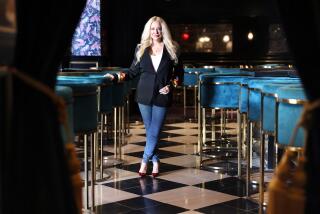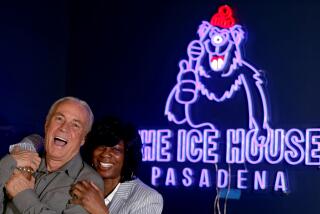BOUNCER USES BRAIN, NOT BRAWN
- Share via
SAN DIEGO — At 37, Terry Irwin is the baron of bar bouncers.
For 13 years, he’s kept a watchful eye on the San Diego night life crowd, the last eight at the Bacchanal on Kearny Mesa.
Five nights a week it’s his job to make sure no one under 21, or without a valid ID card, gets past the front door--and, once inside, that everyone behaves.
He works out two hours a day, six days a week. His Arnold Schwarzenegger build is packed into a 5-foot-9 frame; with his shorn head and bushy mustache, he resembles a turn-of-the-century boxer.
But although he comes into contact with about 3,000 people a week, he said, he averages fewer than a dozen fights a year.
“A bouncer can start a fight any time he wants to,” Irwin said. “The worst thing you can do is overreact, especially when people have been drinking.
“When I sense that someone’s going to explode on me, I’ll back off and get out of his space. I always try to diffuse a situation with words instead of physical force.
“I take great pride in getting troublemakers out of the bar without a fight.”
With a mix of local rock bands and national touring acts--from jazz great Dizzy Gillespie to punk group X--the 550-person capacity Bacchanal is one of the most popular places in town to hear live music.
When the club opens an hour before showtime, Irwin positions himself inside the front door, checking IDs and confiscating any that appear to be altered--or belong to someone else. Police have said bouncers are empowered to confiscate ID cards that appear fake.
“Our liquor license depends on how well I do my job,” he said. “At some punk shows, I’ll take away as many as 10 or 11 ID cards before the night is over.
“I’ve had people cry, scream insults, and even use physical force to get their IDs back. But I have a legal right to hang on to any cards I consider suspicious, no matter what the excuse.”
Quite often, Irwin said, some of the most blatant violators are the performers themselves. A performer who is under age or doesn’t have an ID can’t leave the stage, he said.
“A lot of bands from England don’t know they need an ID . . . ,” he said. “I try to explain the law to them, but a lot of times their egos get in the way and tempers soar.”
“As a result, I’m constantly pulling a Jekyll-and-Hyde. If I have a problem with one person, I can’t let that affect how I treat the next person. If I alienate someone, the entire club’s image could suffer.”
When the music starts and the people are all inside, Irwin becomes a one-man security force. He’ll break up fights, oust troublesome drunks and make sure no one steals any equipment.
“Basically, you need a lot of patience,” he said. “One time this guy was standing directly in front of the stage, blocking everyone’s view and refusing to move.
“He told me he had a brown belt in karate, and I knew he wanted to escalate the situation, so instead of screaming in his ear, I very quietly asked him to come outside with me and talk.
“Once I had him outside, he started shouting and making more threats. But I kept my temper and eventually he calmed down.”
Irwin took his first job as a nightclub bouncer in 1974, after graduating from San Diego State University with a degree in anthropology.
“I had written my thesis on aggression and violence,” he said, “and immediately found that everything I had studied, everything I had written about, was all here in real life.
“I’ve always been interested in people and in human nature, and I can’t think of any job more suitable to those interests.
“That’s why I’m still here. I really enjoy my work, and to me, that’s what counts most.”
More to Read
Go beyond the scoreboard
Get the latest on L.A.'s teams in the daily Sports Report newsletter.
You may occasionally receive promotional content from the Los Angeles Times.










